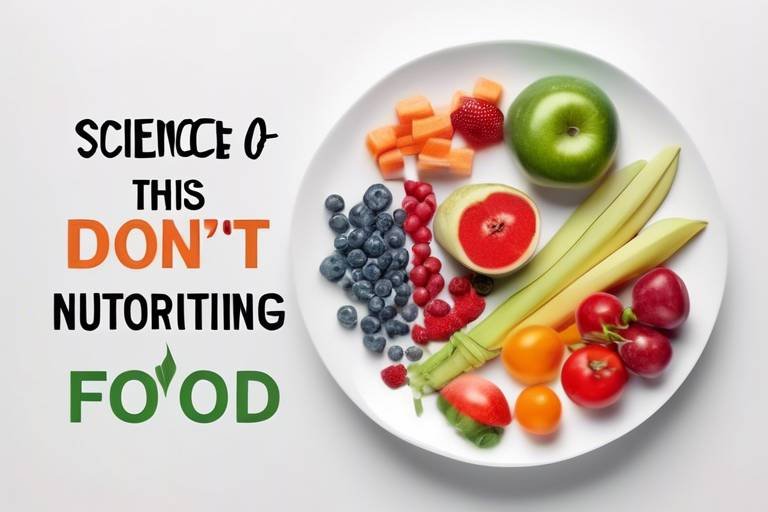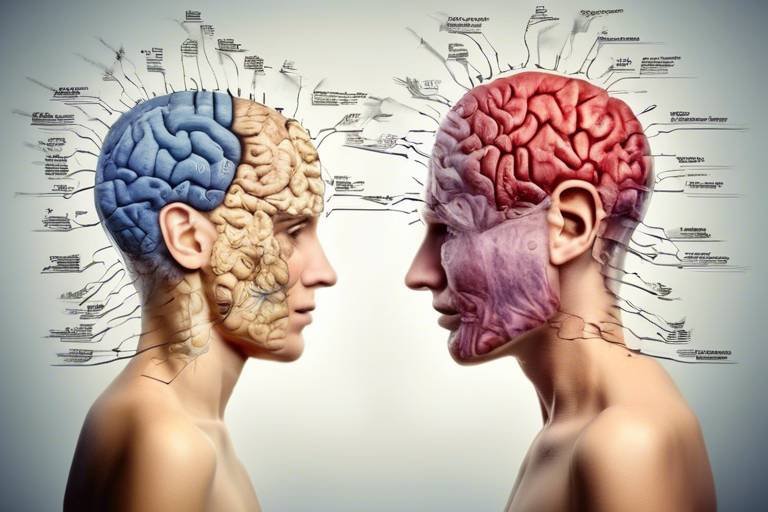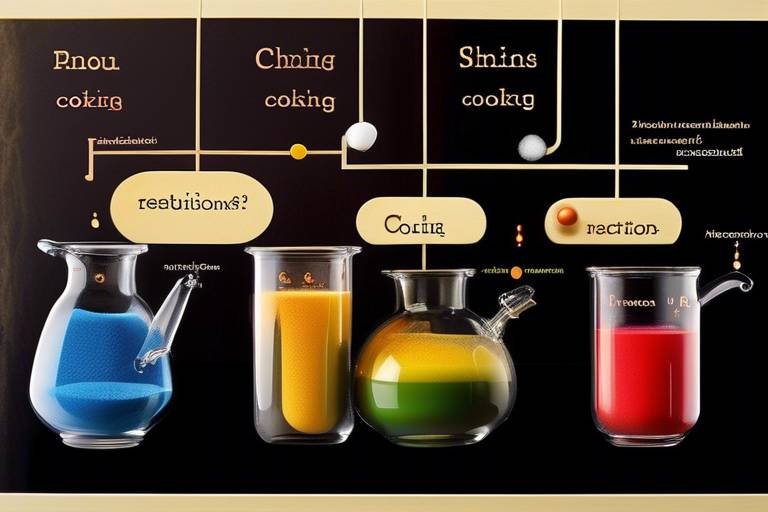How Food Choices Affect Your Health - The Science
Have you ever wondered why some people seem to glow with health while others struggle with various ailments? The answer often lies in their food choices. Our dietary decisions are not just about filling our stomachs; they are intricately woven into the fabric of our overall health and well-being. The science behind nutrition reveals a fascinating world where what we eat can either be our best ally or our worst enemy. In this article, we will explore how different food choices impact our health, focusing on the roles of macronutrients and micronutrients, as well as dietary patterns that can lead to better health outcomes.
Macronutrients—carbohydrates, proteins, and fats—are the building blocks of our diet and are essential for providing energy and supporting bodily functions. Think of them as the fuel for your body's engine. Each macronutrient plays a unique role in maintaining health:
- Carbohydrates: Often viewed as the villain in many diets, carbohydrates are actually the primary source of energy for our bodies. They are crucial for brain function and physical activity. Choosing whole grains, fruits, and vegetables can provide the necessary energy without the added sugars that lead to health issues.
- Proteins: These are the body's building blocks, essential for repairing tissues and making enzymes and hormones. Incorporating lean meats, fish, beans, and nuts into your meals can ensure you get enough protein to support muscle health and overall bodily functions.
- Fats: Despite their bad reputation, healthy fats are vital for brain health and hormone production. Sources like avocados, nuts, and olive oil can provide these necessary fats without the downsides of trans fats found in many processed foods.
Understanding the roles of these macronutrients can empower you to make informed dietary choices that promote health and prevent disease.
While macronutrients are essential for energy, micronutrients—including vitamins and minerals—are critical for maintaining health at a cellular level. A deficiency or excess of these nutrients can lead to serious health issues. For instance, a lack of vitamin D can weaken bones, while too much iron can damage organs. Therefore, a balanced diet rich in micronutrients is crucial for overall well-being.
Vitamins are vital for numerous biochemical processes in the body. Each vitamin has unique roles, and knowing their functions can guide dietary choices for optimal health. Here’s a quick breakdown:
Water-soluble vitamins, such as the B-complex group and vitamin C, are crucial for energy production and immune function. Ensuring adequate intake of these vitamins can prevent deficiencies and promote overall health. Foods rich in these vitamins include:
- Citrus fruits
- Leafy greens
- Whole grains
On the other hand, fat-soluble vitamins—such as A, D, E, and K—are essential for various bodily functions, including vision, bone health, and blood clotting. Understanding their sources and benefits can help in maintaining a balanced diet. Foods rich in fat-soluble vitamins include:
- Carrots (Vitamin A)
- Fish liver oils (Vitamin D)
- Nuts and seeds (Vitamin E)
- Leafy greens (Vitamin K)
Minerals are essential for many physiological processes, including bone health and nerve function. A diet rich in diverse food sources ensures adequate mineral intake for overall wellness. For instance, calcium is vital for bone strength, while potassium helps regulate blood pressure. Eating a variety of foods, such as dairy products, fruits, vegetables, and whole grains, can help meet your mineral needs.
Different dietary patterns, such as the Mediterranean or plant-based diets, are linked to various health outcomes. Exploring these patterns can provide insights into making healthier food choices. For example, the Mediterranean diet emphasizes whole foods, healthy fats, and lean proteins, which research shows can reduce the risk of chronic diseases and promote longevity.
This diet is not just a way of eating; it's a lifestyle that prioritizes fresh, seasonal ingredients. By focusing on fruits, vegetables, whole grains, and healthy fats, the Mediterranean diet fosters a holistic approach to health. Studies have shown that adhering to this diet can lead to a lower risk of heart disease, diabetes, and even certain cancers.
Similarly, plant-based diets, which focus on fruits, vegetables, legumes, and whole grains, have gained popularity for their health benefits. Evidence suggests that these diets can improve heart health and reduce the risk of certain cancers. By consuming more plant-based foods, individuals not only support their health but also contribute to a more sustainable food system.
Q: What are the healthiest food choices I can make?
A: Focus on whole, unprocessed foods like fruits, vegetables, whole grains, lean proteins, and healthy fats. Avoid added sugars and processed foods whenever possible.
Q: How can I ensure I’m getting enough vitamins and minerals?
A: Eating a varied diet rich in fruits, vegetables, whole grains, and lean proteins will help you meet your micronutrient needs. Consider speaking with a healthcare provider about supplements if necessary.
Q: Is it necessary to follow a specific diet to be healthy?
A: Not necessarily! While certain diets like the Mediterranean or plant-based diets are beneficial, the key is to maintain a balanced and varied diet that suits your lifestyle and preferences.

The Role of Macronutrients
Macronutrients—carbohydrates, proteins, and fats—are the building blocks of our diet and are essential for energy and numerous bodily functions. Imagine your body as a finely-tuned machine; just like a car needs fuel, oil, and coolant to run smoothly, your body requires these macronutrients to function optimally. Each macronutrient plays a unique role in maintaining health, and understanding their functions can empower you to make informed dietary choices.
Carbohydrates are often seen as the enemy in many diets, but they are actually the primary source of energy for our bodies. When you consume carbs, your body breaks them down into glucose, which fuels your brain, muscles, and organs. Think of carbohydrates as the gas that keeps your engine running. However, not all carbs are created equal. Simple carbohydrates, like those found in candy and soda, can cause spikes in blood sugar, while complex carbohydrates, such as whole grains and legumes, provide sustained energy and are rich in fiber, which aids digestion.
Next up are proteins, the body’s building blocks. They are essential for repairing tissues, making enzymes, and supporting immune function. You can think of protein as the construction crew that builds and maintains your body. Protein is made up of amino acids, some of which are essential, meaning your body cannot produce them and you must obtain them from your diet. Foods rich in protein include meat, fish, eggs, dairy, legumes, and nuts. Incorporating a variety of these sources can help ensure you’re getting all the necessary amino acids.
Lastly, we have fats, which are crucial for hormone production, nutrient absorption, and providing energy. While fats have often been demonized in popular culture, they are vital for health. Imagine fats as the insulation in your house; they protect and keep everything running efficiently. There are different types of fats: saturated, unsaturated, and trans fats. Unsaturated fats, found in foods like avocados and olive oil, are beneficial for heart health, while trans fats, often found in processed foods, should be avoided. Balancing your fat intake is key to reaping the benefits without the drawbacks.
To summarize, here’s a quick breakdown of the macronutrients and their roles:
| Macronutrient | Function | Sources |
|---|---|---|
| Carbohydrates | Primary energy source | Whole grains, fruits, vegetables |
| Proteins | Tissue repair and growth | Meat, fish, eggs, legumes |
| Fats | Hormone production and energy | Nuts, seeds, avocados, olive oil |
Understanding the role of each macronutrient in your diet can help you make better food choices that not only satisfy your hunger but also nourish your body. By focusing on a balanced intake of carbohydrates, proteins, and fats, you can enhance your overall health and well-being. So, the next time you plan your meals, think about how you can incorporate a variety of these macronutrients to fuel your body effectively!

The Impact of Micronutrients
When we think about our health, we often focus on the macronutrients—those big players like carbohydrates, proteins, and fats. But let’s not forget about the unsung heroes: micronutrients. These tiny but mighty nutrients, which include vitamins and minerals, are crucial for maintaining our health and well-being. They may be required in smaller amounts compared to macronutrients, but their impact is anything but small. A deficiency or excess of these nutrients can lead to serious health issues, making it essential to understand their roles in our diets.
Micronutrients are involved in a variety of bodily functions. For instance, some vitamins help convert food into energy, while others support our immune system or aid in blood clotting. Minerals, on the other hand, play key roles in bone health, nerve function, and muscle contraction. It’s a delicate balance; too little or too much of a micronutrient can lead to a cascade of health problems. For example, a lack of vitamin D can result in weakened bones, while an excess can lead to toxicity. This is why having a balanced diet that includes a variety of foods is so important.
Let’s break it down further. Here’s a quick overview of some essential vitamins and minerals and their functions:
| Micronutrient | Function | Food Sources |
|---|---|---|
| Vitamin A | Supports vision and immune function | Carrots, sweet potatoes, spinach |
| Vitamin C | Antioxidant, supports skin health and immune function | Citrus fruits, strawberries, bell peppers |
| Iron | Essential for blood production | Red meat, beans, lentils |
| Calcium | Crucial for bone health | Dairy products, leafy greens, fortified foods |
As you can see, each micronutrient has its unique role, and knowing what they do can help you make more informed food choices. For instance, if you’re looking to boost your immune system, you might want to focus on getting enough vitamin C. On the flip side, if you’re concerned about bone health, ensuring you have enough calcium and vitamin D in your diet is key.
Moreover, the sources of these micronutrients can vary widely. While supplements are an option, obtaining nutrients from whole foods is often more beneficial. Whole foods come packed with a range of nutrients and other beneficial compounds that work synergistically to promote health. So, instead of reaching for a pill, consider a colorful plate filled with fruits, vegetables, whole grains, and lean proteins. This not only ensures a diverse intake of micronutrients but also makes your meals more enjoyable.
In conclusion, the impact of micronutrients on our health cannot be overstated. They play vital roles in almost every bodily function, and maintaining a balanced intake is crucial for preventing deficiencies and promoting overall wellness. So, the next time you plan your meals, remember to think beyond just the macronutrients and consider how you can incorporate a variety of micronutrients into your diet!
- What are micronutrients? Micronutrients include vitamins and minerals that are essential for various bodily functions.
- Why are micronutrients important? They support growth, immune function, brain health, and overall well-being.
- Can I get enough micronutrients from my diet? Yes, a balanced diet rich in fruits, vegetables, whole grains, and lean proteins can provide adequate micronutrients.
- Should I take supplements for micronutrients? It’s best to get nutrients from food, but supplements can be helpful if you have specific deficiencies.

Vitamins and Their Functions
Vitamins are like the unsung heroes of our diet; they perform a multitude of roles that are essential for maintaining our health and well-being. Each vitamin has its unique function, almost like a specialized worker in a bustling factory, contributing to the overall production of health. For instance, vitamin C is renowned for its role in boosting the immune system, while the B-complex vitamins are pivotal for energy metabolism. It's fascinating to think about how these tiny compounds can have such a profound impact on our bodies!
To truly appreciate the importance of vitamins, it's crucial to understand their classifications. Vitamins are generally divided into two categories: water-soluble and fat-soluble. Water-soluble vitamins, which include the B-complex vitamins and vitamin C, dissolve in water and are not stored in the body. This means we need to consume them regularly to avoid deficiencies. On the other hand, fat-soluble vitamins—such as A, D, E, and K—are stored in the body's fatty tissues and liver, making it possible to go longer without consuming them.
Here's a closer look at some key vitamins and their functions:
| Vitamin | Function | Sources |
|---|---|---|
| Vitamin A | Essential for vision and immune function | Carrots, sweet potatoes, spinach |
| Vitamin C | Boosts immune health and aids in collagen production | Citrus fruits, strawberries, bell peppers |
| Vitamin D | Supports bone health and calcium absorption | Sunlight, fortified dairy products, fatty fish |
| Vitamin E | Acts as an antioxidant and supports skin health | Nuts, seeds, spinach |
| Vitamin K | Important for blood clotting and bone metabolism | Leafy greens, broccoli, Brussels sprouts |
Understanding these vitamins and their functions can empower you to make better dietary choices. For example, if you know that vitamin D is crucial for bone health, you might be more inclined to spend some time in the sun or include fortified foods in your diet. It's all about connecting the dots between what you eat and how it affects your body.
Moreover, the balance of vitamins in your diet is essential. Too much of a good thing can lead to toxicity, especially with fat-soluble vitamins that accumulate in the body. On the flip side, deficiencies can lead to serious health issues, such as scurvy from a lack of vitamin C or rickets due to insufficient vitamin D. Therefore, it's important to aim for a diverse diet rich in various foods to cover your vitamin needs.
In conclusion, vitamins are not just a footnote in the nutrition chapter of our lives; they are central players. By understanding their functions and ensuring we get enough of each type, we can significantly enhance our health and well-being. So, next time you reach for a snack, think about the vitamins it contains and how they can support your body!
- What are the best sources of vitamins? - Fruits, vegetables, nuts, seeds, and whole grains are excellent sources of various vitamins.
- Can I get all my vitamins from food? - Ideally, yes! A balanced diet should provide you with all the necessary vitamins, but some individuals may need supplements.
- How do I know if I'm deficient in vitamins? - Symptoms of vitamin deficiency can vary; if you suspect a deficiency, it's best to consult a healthcare professional.
- Are vitamin supplements necessary? - Supplements can be beneficial for some, especially those with dietary restrictions, but it's always best to get nutrients from food first.

Water-Soluble Vitamins
Water-soluble vitamins, which include the B-complex vitamins and vitamin C, are essential players in the grand orchestra of our body's biochemical processes. Unlike their fat-soluble counterparts, these vitamins dissolve in water and are not stored in the body, making regular consumption crucial for maintaining optimal health. Imagine your body as a high-performance machine; without these vital nutrients, it’s like running a car on low-quality fuel—it just won’t perform at its best.
One of the primary roles of water-soluble vitamins is to aid in the production of energy. For instance, the B-complex vitamins, which encompass B1 (thiamine), B2 (riboflavin), B3 (niacin), B5 (pantothenic acid), B6 (pyridoxine), B7 (biotin), B9 (folate), and B12 (cobalamin), play pivotal roles in converting carbohydrates, fats, and proteins into usable energy. Without adequate levels of these vitamins, you may feel sluggish and fatigued, as your body struggles to extract energy from the food you consume.
Moreover, vitamin C, known for its immune-boosting properties, is not just a seasonal ally during cold and flu season. It is crucial for the synthesis of collagen, a protein that helps maintain healthy skin, blood vessels, and connective tissues. Think of collagen as the glue that holds your body together! A deficiency in vitamin C can lead to scurvy, a condition characterized by fatigue, swollen gums, and joint pain, highlighting just how important this vitamin is for overall health.
Since water-soluble vitamins are not stored in the body, it’s essential to include a variety of foods in your diet to ensure you’re getting enough of these nutrients. Here are some excellent sources:
- B1 (Thiamine): Whole grains, legumes, and nuts.
- B2 (Riboflavin): Dairy products, eggs, and green leafy vegetables.
- B3 (Niacin): Meat, fish, and whole grains.
- B6 (Pyridoxine): Fish, potatoes, and non-citrus fruits.
- B12 (Cobalamin): Meat, dairy, and fortified cereals.
- Vitamin C: Citrus fruits, strawberries, bell peppers, and broccoli.
It’s fascinating to note that cooking methods can impact the levels of these vitamins in your food. For instance, boiling vegetables can cause significant losses of water-soluble vitamins, as they leach into the cooking water. To retain these nutrients, consider steaming or microwaving your veggies instead. Remember, every little bit counts when it comes to your health!
In summary, water-soluble vitamins are vital for energy production, immune function, and overall well-being. Regularly incorporating a variety of foods rich in these vitamins into your diet helps ensure that your body operates efficiently, much like a well-oiled machine. So, next time you’re planning your meals, think about how you can boost your intake of these essential nutrients, and your body will thank you!
Q: What happens if I don't get enough water-soluble vitamins?
A: A deficiency can lead to a variety of health issues, including fatigue, weakened immune function, and other serious conditions depending on which vitamin is lacking.
Q: Can I take supplements instead of getting vitamins from food?
A: While supplements can help, it's always best to get your nutrients from whole foods, as they provide additional health benefits and are better absorbed by the body.
Q: How can I ensure I’m getting enough water-soluble vitamins?
A: Focus on a balanced diet that includes a variety of fruits, vegetables, whole grains, and lean proteins. Regularly consuming these foods will help you meet your nutritional needs.

Fat-Soluble Vitamins
Fat-soluble vitamins are a group of essential nutrients that play crucial roles in maintaining our health. Unlike their water-soluble counterparts, these vitamins require dietary fat for proper absorption and utilization in the body. The four main fat-soluble vitamins are Vitamin A, Vitamin D, Vitamin E, and Vitamin K. Each of these vitamins contributes uniquely to our physiological functions, making it vital to include them in our diets.
Let's take a closer look at each of these vitamins and their significance:
| Vitamin | Functions | Food Sources |
|---|---|---|
| Vitamin A | Essential for vision, immune function, and skin health. | Carrots, sweet potatoes, spinach, and liver. |
| Vitamin D | Important for calcium absorption, bone health, and immune support. | Fatty fish, fortified dairy products, and sunlight exposure. |
| Vitamin E | Acts as an antioxidant, protecting cells from damage. | Nuts, seeds, and green leafy vegetables. |
| Vitamin K | Crucial for blood clotting and bone metabolism. | Green leafy vegetables, broccoli, and Brussels sprouts. |
Each vitamin serves multiple functions that are indispensable for our well-being. For instance, Vitamin A is not just about keeping your eyesight sharp; it also supports your immune system and skin health. Imagine your body as a finely tuned machine; without adequate Vitamin A, certain parts may start to falter.
Similarly, Vitamin D is often referred to as the "sunshine vitamin" because your body can produce it when exposed to sunlight. It’s vital for maintaining strong bones, as it helps the body absorb calcium effectively. A deficiency in Vitamin D can lead to weakened bones, akin to a house built on a shaky foundation.
Vitamin E is another essential player, acting as a powerful antioxidant that helps protect your cells from oxidative stress. This can be likened to a shield that guards your body against harmful invaders. Without sufficient Vitamin E, your body may struggle to fend off oxidative damage, which can lead to chronic diseases.
Lastly, Vitamin K is crucial for blood clotting and maintaining bone health. Think of it as the unsung hero that ensures your body can heal properly after an injury. Without adequate Vitamin K, your blood may not clot effectively, leading to potential health risks.
Incorporating these fat-soluble vitamins into your diet isn't just about avoiding deficiencies; it’s about optimizing your health. Since these vitamins are stored in your body's fatty tissues, it's essential to consume them regularly but in moderation. A balanced diet that includes healthy fats can help ensure that your body absorbs these vital nutrients effectively.
- What are fat-soluble vitamins?
Fat-soluble vitamins are vitamins that are absorbed along with fats in the diet and are stored in the body's fatty tissues. - Why are fat-soluble vitamins important?
These vitamins play critical roles in various bodily functions, including vision, bone health, and immune function. - How can I ensure I get enough fat-soluble vitamins?
Incorporate a variety of foods rich in these vitamins, such as leafy greens, fish, nuts, and dairy products, into your diet.

The Importance of Minerals
Minerals are often the unsung heroes of our diets, playing crucial roles in maintaining our overall health and well-being. They are inorganic substances that our bodies need in small amounts to function properly. Think of them as the building blocks that help keep our physiological processes running smoothly. Without adequate mineral intake, our bodies may struggle to perform essential functions, leading to a variety of health issues. It’s fascinating to consider how something so small can have such a profound impact on our health!
Minerals can be categorized into two main groups: macrominerals and microminerals. Macrominerals, such as calcium, potassium, and magnesium, are needed in larger amounts, while microminerals, like iron, zinc, and selenium, are required in trace amounts. Both types are essential for different bodily functions. For example, calcium is vital for bone health, while iron is crucial for transporting oxygen in the blood.
To illustrate the significance of minerals, consider the following table that highlights some key minerals, their functions, and food sources:
| Mineral | Function | Food Sources |
|---|---|---|
| Calcium | Bone health, muscle function | Dairy products, leafy greens, almonds |
| Iron | Oxygen transport in blood | Red meat, beans, fortified cereals |
| Magnesium | Nerve function, muscle contraction | Nuts, seeds, whole grains |
| Zinc | Immune function, wound healing | Meat, shellfish, legumes |
When it comes to mineral intake, balance is key. Too little of a mineral can lead to deficiencies, while too much can result in toxicity. For instance, a deficiency in calcium can lead to osteoporosis, a condition characterized by weak and brittle bones. On the other hand, excessive iron intake can cause organ damage. This delicate balance underscores the importance of a diverse diet rich in various food sources to ensure you’re getting all the minerals you need.
Incorporating a variety of foods into your diet is an excellent way to ensure you’re meeting your mineral requirements. By consuming a mix of fruits, vegetables, whole grains, and lean proteins, you can help support your body’s mineral needs. Remember, just as a car needs different types of fuel to run efficiently, your body needs a range of minerals to function optimally. So, next time you sit down for a meal, think about how you can include a rainbow of foods to support your health!
- What are the signs of mineral deficiency? Symptoms can vary depending on the mineral, but common signs include fatigue, weakness, muscle cramps, and irritability.
- Can I get enough minerals from supplements? While supplements can help, it’s best to get minerals from whole foods, as they provide additional nutrients and benefits.
- How can I ensure I’m getting enough minerals? Focus on a balanced diet that includes a variety of foods from all food groups, and consult with a healthcare professional if you have concerns.

Dietary Patterns and Health Outcomes
When it comes to our health, what we eat matters—a lot! The choices we make at the dinner table can ripple through our bodies, affecting everything from our energy levels to our risk of chronic diseases. It’s fascinating how different dietary patterns can lead to varying health outcomes. For instance, if you think of your diet as a roadmap, each path you take can lead to a different destination in terms of well-being. So, let’s dive into some popular dietary patterns and see how they stack up against each other.
The Mediterranean diet is one of the most celebrated eating patterns out there. It's not just about food; it's a lifestyle! This diet emphasizes whole foods, healthy fats, and lean proteins, primarily sourced from fruits, vegetables, whole grains, legumes, and fish. Research indicates that adhering to this dietary pattern can significantly reduce the risk of chronic diseases such as heart disease and diabetes. Imagine your body as a car; this diet fuels it with premium gas, enhancing performance and longevity.
On the other side of the spectrum, we have plant-based diets, which focus primarily on foods derived from plants. This includes not just fruits and vegetables, but also nuts, seeds, oils, whole grains, legumes, and beans. Studies have shown that individuals following plant-based diets often experience improved heart health and a lower risk of certain cancers. Think of it this way: a plant-based diet is like a lush garden, nourishing your body with vibrant, nutrient-dense foods that help it flourish.
Now, you might be wondering: how do these dietary patterns translate into actual health benefits? Let’s take a look at some key comparisons:
| Dietary Pattern | Key Features | Health Benefits |
|---|---|---|
| Mediterranean Diet | Whole foods, healthy fats, lean proteins | Reduced risk of heart disease, improved longevity |
| Plant-Based Diet | Fruits, vegetables, legumes, whole grains | Improved heart health, lower cancer risk |
Each dietary pattern has its unique strengths, and the best part is that they can often be combined for even greater health benefits. For example, incorporating more plant-based meals into a Mediterranean framework can give you the best of both worlds. But remember, it’s not just about what you eat; it’s also about how you eat. Mindful eating practices, such as savoring your food and paying attention to hunger cues, can amplify the benefits of any dietary pattern.
In conclusion, understanding the intricate relationship between dietary patterns and health outcomes can empower you to make informed choices. By embracing a balanced approach that incorporates elements from various diets, you can pave the way for a healthier, happier life. So, what will you choose for your next meal? The journey to better health starts with a single bite!
- What is the Mediterranean diet? The Mediterranean diet emphasizes whole foods, healthy fats, and lean proteins, primarily from fruits, vegetables, whole grains, and fish.
- What are the benefits of a plant-based diet? Plant-based diets can improve heart health, lower the risk of certain cancers, and promote overall wellness.
- Can I mix different dietary patterns? Absolutely! Combining elements from various diets can enhance health benefits and provide more nutritional variety.
- How can I start eating healthier? Begin by incorporating more whole foods into your meals and practicing mindful eating.

The Mediterranean Diet
The Mediterranean diet is not just a meal plan; it’s a way of life that celebrates the essence of wholesome eating. Originating from the countries bordering the Mediterranean Sea, this diet emphasizes the consumption of whole foods and a variety of flavors that not only tantalize your taste buds but also nourish your body. Imagine sitting under the warm sun, enjoying a colorful plate filled with fresh vegetables, grains, and a drizzle of olive oil—this is the Mediterranean lifestyle in action!
At its core, the Mediterranean diet is rich in healthy fats, particularly from sources like olive oil, nuts, and fish. These fats are essential for heart health and provide a satisfying flavor that can transform any dish. In contrast to the typical Western diet, which often includes processed foods high in saturated fats and sugars, the Mediterranean approach encourages the intake of lean proteins from fish and poultry, while limiting red meat and processed meats. This balance not only supports physical health but also promotes a sustainable way of living.
One of the most appealing aspects of the Mediterranean diet is its flexibility. It doesn’t prescribe strict rules or eliminate entire food groups. Instead, it encourages a variety of foods, allowing individuals to explore and enjoy different flavors. A typical Mediterranean meal might include:
- Fresh salads with a variety of vegetables
- Whole grain bread or pasta
- Legumes such as lentils and chickpeas
- Fruits for dessert, often drizzled with honey
- Herbs and spices to enhance flavor without added salt
Research shows that adhering to the Mediterranean diet can significantly reduce the risk of chronic diseases such as heart disease, diabetes, and certain cancers. A study published in the New England Journal of Medicine found that participants following this diet had a 30% lower risk of heart attacks and strokes compared to those on a low-fat diet. This is largely attributed to the diet’s emphasis on nutrient-dense foods that support overall health.
Moreover, the social aspect of dining is vital in the Mediterranean culture. Meals are often enjoyed with family and friends, promoting not just a healthy diet, but also a healthy lifestyle. This communal approach to eating fosters connections and enhances the overall dining experience, making every meal an opportunity to bond and share. So, the next time you sit down for a meal, consider how you can incorporate the Mediterranean principles into your dining habits—not just for your health, but for your happiness too!
What are the main components of the Mediterranean diet?
The Mediterranean diet primarily consists of fruits, vegetables, whole grains, legumes, nuts, and healthy fats like olive oil. It includes moderate amounts of fish and poultry, while red meat is consumed sparingly.
Is the Mediterranean diet suitable for everyone?
Yes! The Mediterranean diet is adaptable and can be tailored to fit various dietary needs and preferences. It emphasizes whole foods and can be adjusted for vegetarian or vegan lifestyles as well.
Can I lose weight on the Mediterranean diet?
Absolutely! While the Mediterranean diet is not a weight-loss plan per se, its focus on nutrient-dense foods and healthy fats can lead to weight loss and maintenance when combined with portion control and regular physical activity.
How can I start incorporating the Mediterranean diet into my meals?
Begin by gradually adding more fruits, vegetables, and whole grains to your meals. Swap out butter for olive oil, and try to include fish in your diet a couple of times a week. Experiment with herbs and spices to enhance flavor without added salt.

Plant-Based Diets
Adopting a plant-based diet is more than just a trend; it’s a lifestyle choice that can significantly impact your health and well-being. Imagine filling your plate with vibrant colors, fresh flavors, and a variety of textures. This diet primarily consists of fruits, vegetables, legumes, nuts, seeds, and whole grains, leaving little room for processed foods and animal products. The beauty of a plant-based diet lies in its simplicity and its ability to nourish your body while also being environmentally friendly.
Research has shown that individuals who follow a plant-based diet often enjoy a plethora of health benefits. For instance, studies indicate that such diets can lead to improved heart health, better weight management, and a reduced risk of chronic diseases like diabetes and certain types of cancer. But why is this the case? The answer lies in the rich array of nutrients found in plant foods, including fiber, vitamins, minerals, and antioxidants, which work together to enhance bodily functions and protect against disease.
One of the standout features of a plant-based diet is its high fiber content. Fiber plays a crucial role in digestive health, helping to regulate bowel movements and prevent constipation. Moreover, it aids in maintaining a healthy weight by promoting feelings of fullness, which can prevent overeating. As you incorporate more fiber-rich foods into your meals, you may find that you feel satisfied longer, which is a game changer for those looking to manage their weight.
Let’s not forget about the environmental impact of plant-based eating. By reducing meat and dairy consumption, you contribute to lower greenhouse gas emissions and a smaller carbon footprint. In fact, studies suggest that shifting towards a plant-based diet could be one of the most effective ways to combat climate change. So, not only are you doing wonders for your health, but you’re also playing a part in preserving the planet for future generations.
However, transitioning to a plant-based diet doesn’t mean you have to give up your favorite foods entirely. Instead, think of it as an opportunity to experiment with new ingredients and recipes. For example, instead of a traditional burger, you could try a black bean burger or a savory lentil loaf. The possibilities are endless, and the culinary adventure can be incredibly rewarding.
To make the most out of a plant-based diet, it’s essential to ensure that you’re getting all the necessary nutrients. For instance, while fruits and vegetables are packed with vitamins, you might need to pay special attention to nutrients like Vitamin B12, iron, and omega-3 fatty acids, which are typically found in animal products. Incorporating fortified foods or supplements can help bridge these gaps.
In summary, embracing a plant-based diet can lead to remarkable health benefits, enhance your culinary experiences, and contribute positively to the environment. So, why not take the plunge and explore the vibrant world of plant-based eating? You might just find that it transforms not only your meals but your overall lifestyle as well.
- What is a plant-based diet? A plant-based diet focuses primarily on foods derived from plants, including fruits, vegetables, grains, legumes, nuts, and seeds, while minimizing or eliminating animal products.
- Can I get enough protein on a plant-based diet? Yes! There are plenty of plant-based protein sources, such as beans, lentils, tofu, tempeh, and quinoa, that can help meet your protein needs.
- Will I miss out on nutrients? With careful planning, a plant-based diet can provide all the necessary nutrients, but it’s important to be mindful of nutrients like Vitamin B12, iron, and omega-3 fatty acids.
- How can I transition to a plant-based diet? Start by incorporating more plant-based meals into your week, experimenting with new recipes, and gradually reducing your intake of animal products.
Frequently Asked Questions
- How do macronutrients affect my health?
Macronutrients—carbohydrates, proteins, and fats—are the building blocks of your diet. They provide energy and are crucial for bodily functions. For instance, carbohydrates fuel your brain and muscles, proteins help repair tissues, and fats support cell growth. Understanding how to balance these can lead to better health outcomes.
- What are micronutrients and why are they important?
Micronutrients, which include vitamins and minerals, are essential for maintaining good health. They play critical roles in processes like immune function, bone health, and energy production. A deficiency in these nutrients can lead to significant health problems, so a balanced diet rich in fruits, vegetables, and whole grains is crucial.
- What are the benefits of the Mediterranean diet?
The Mediterranean diet is renowned for its health benefits, including reduced risk of chronic diseases such as heart disease and diabetes. It emphasizes whole foods, healthy fats, and lean proteins, promoting longevity and overall wellness. Incorporating this diet into your lifestyle can be a tasty and nutritious way to eat!
- Can a plant-based diet really improve my health?
Absolutely! Plant-based diets, rich in fruits, vegetables, legumes, and whole grains, have been linked to improved heart health and a reduced risk of certain cancers. These diets are packed with nutrients and antioxidants that can boost your overall well-being while also being environmentally friendly.
- What are water-soluble vitamins?
Water-soluble vitamins, such as B-complex and vitamin C, are essential for energy production and maintaining a healthy immune system. Since they are not stored in the body, it's important to consume them regularly through your diet to prevent deficiencies and support overall health.
- What are fat-soluble vitamins and their sources?
Fat-soluble vitamins include A, D, E, and K, and they play vital roles in functions like vision, bone health, and blood clotting. These vitamins are stored in the body's fatty tissues, so they don't need to be consumed as frequently. Good sources include dairy products, fish, nuts, and leafy greens.
- How can I ensure I'm getting enough minerals in my diet?
To ensure adequate mineral intake, focus on a diverse diet that includes a variety of foods. Incorporate nuts, seeds, whole grains, dairy, and plenty of fruits and vegetables. Each food group offers different minerals, so variety is key to meeting your nutritional needs.



















